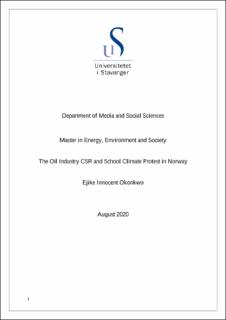| dc.description.abstract | Despite being a significant fossil fuel exporter, Norway is often perceived as one of the greenest countries in Europe. The Corporate Social Responsibility (CSR) strategies of oil and gas companies represent a key element behind this perception. If these CSR strategies are resulting in genuine contributions to environmental targets, they could be regarded as one important tool for achieving the green shift. Whether CSR strategies can be effective in this way depends on several societal framework conditions. Young people constitute an indispensable element in this context, as this group indicates the evolution of those social norms and identities CSR strategies must take into consideration. Recent climate protests of young people in Norway and all over the world put the established CSR strategies and the ability of the industry to contribute to the green transition to the test. The response of the Norwegian oil and gas industry to these protests is particularly significant, as Norwegian society is strongly guided by the idea of aligning economic activity with societal values. Stronger than elsewhere, companies are expected to contribute to values across environmental, social, and economic dimensions as stipulated by the policy guidelines set by the Norwegian government.
This study thus examines how young people at various Norwegian institutions perceive and portray the oil industry’s response to the recent school climate protest in Norway. Energy experts within academia were also consulted. Social Constructivist theory provides the theoretical underpinning for explaining how young people construct their social realities, while semi-structured interview, and discourse analysis were utilized in data collection and analysis. Firstly, findings show that despite the tremendous contributions of the oil industry’s CSR in three-main areas such as sports, culture, and entertainment, there is inadequate knowledge-based engagement of young people in companies CSR. Secondly, young people perceive the existing climate measures by the industry as slow-paced, rhetoric driven, and largely public relations based. Hence, their decision to embark on climate activism to demand for genuine and increased commitment to climate action beyond political gains and rhetoric’s. The oil industry should implement new measures that would guarantee the broadening of their CSR to include specifically designed programs for increased green innovation-based youth engagement, participation and mutual communication with young people towards shaping their energy future as well as accelerate climate action. | en_US |
